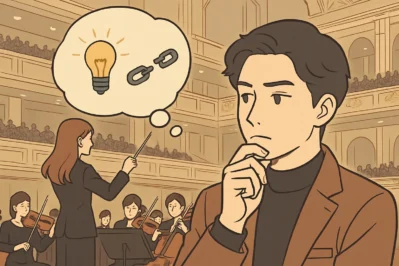Sound Like a Pro: Critiquing Classical Music in Korean
Hello! Welcome to Maeil Hangul, where we upgrade your Korean skills!
Ever wanted to discuss art, music, or a performance with the sophistication of a seasoned critic? Today, we’re diving into the high-level language needed to critique a symphony orchestra’s season program. You might think this is niche, but you’d be surprised! Lately in Korea, classical music is experiencing a huge revival, especially among younger audiences, thanks to popular dramas like ‘Maestra: Strings of Truth’. Suddenly, conversations about a conductor’s interpretation or an orchestra’s programming are happening not just in concert halls, but in trendy cafes and on social media. Let’s get you ready to join that conversation!
Key Expressions for the Aspiring Critic
Here are some advanced phrases that will make you sound like a true connoisseur when discussing an artistic plan.
1. 참신하다 (Cham-shin-ha-da)
- Pronunciation [Romanized]: Cham-shin-ha-da
- English Meaning: To be novel, fresh, original.
- Detailed Explanation: This is the perfect adjective to praise an innovative or unconventional idea. It goes beyond a simple “good” (좋다) or “new” (새롭다) to imply a creative and refreshing quality. It’s a highly positive term used in professional and academic critiques of art, research, or business plans.
- Example Sentence: 이번 시즌 프로그램은 고전과 현대를 아우르는 참신한 기획이 돋보입니다. (This season’s program stands out for its novel plan that encompasses both classical and contemporary music.)
2. 일관성이 결여되다 (Il-gwan-seong-i gyeol-yeo-doe-da)
- Pronunciation [Romanized]: Il-gwan-seong-i gyeo-ryeo-dwe-da
- English Meaning: To lack consistency; to be disjointed.
- Detailed Explanation: This is a sophisticated and formal way to point out a weakness in a program or argument. “결여되다” means “to be lacking” or “to be deficient in,” and “일관성” means “consistency.” Using this phrase shows you’re not just looking at individual pieces, but at the overall thematic coherence of the entire season. It’s a powerful tool for constructive criticism.
- Example Sentence: 각 공연은 훌륭하지만, 전체를 놓고 보면 테마의 일관성이 결여된 느낌입니다. (Each performance is excellent, but looking at the whole, it feels like it lacks thematic consistency.)
3. 아쉬움이 남는다 (A-swi-um-i nam-neun-da)
- Pronunciation [Romanized]: A-swi-um-i nam-neun-da
- English Meaning: It leaves something to be desired; It’s a bit disappointing.
- Detailed Explanation: This is a quintessential Korean expression of polite and indirect criticism. Instead of saying “It’s bad” (나쁘다), you say “a feeling of regret/longing remains” (아쉬움이 남는다). It softens the critique while still clearly communicating that a certain aspect didn’t meet expectations. It’s incredibly useful for maintaining a respectful tone in professional feedback.
- Example Sentence: 연주자들의 기량은 최고였지만, 선곡 면에서는 다소 아쉬움이 남습니다. (The musicians’ skills were top-notch, but the song selection left something to be desired.)
4. 재해석의 여지가 있다 (Jae-hae-seog-ui yeo-ji-ga it-da)
- Pronunciation [Romanized]: Jae-hae-seok-ui yeo-ji-ga it-da
- English Meaning: There is room for reinterpretation.
- Detailed Explanation: This phrase is a brilliant way to offer a suggestion or alternative perspective. “재해석” means “reinterpretation,” and “여지” means “room” or “space.” You’re not saying the current interpretation is wrong, but rather that other valid artistic approaches exist. It positions you as a thoughtful analyst who considers multiple possibilities.
- Example Sentence: 모두가 아는 곡이지만, 지휘자에 따라 얼마든지 재해석의 여지가 있는 작품입니다. (It’s a well-known piece, but it’s a work that has plenty of room for reinterpretation depending on the conductor.)
Example Dialogue: At the Arts Foundation
Let’s see how two colleagues, Min-jun and Seo-yeon, might use these expressions while reviewing a proposal for the national orchestra’s next season.
A (민준): 서연 씨, 다음 시즌 교향악단 프로그램 기획안 보셨어요? 젊은 작곡가들의 곡을 전면에 내세운 게 아주 참신하네요.
(Seo-yeon, have you seen the program proposal for the orchestra’s next season? Putting works by young composers at the forefront is very novel.)
B (서연): 네, 저도 그 점은 인상 깊게 봤어요. 그런데 전반적인 흐름을 보면 테마의 일관성이 결여된 것 같아 조금 아쉬움이 남아요. 1부는 바로크, 2부는 완전한 현대 음악이라서요.
(Yes, I was impressed by that point too. However, looking at the overall flow, I feel it lacks consistency, which leaves something to be desired. Part 1 is Baroque, while Part 2 is completely contemporary music.)
A (민준): 맞는 말씀이에요. 특히 드라마 ‘마에스트라’ 때문에 유명해진 말러 교향곡 같은 대중적인 곡이 하나쯤 있었으면 어땠을까 싶어요.
(You have a point. I wonder how it would’ve been if they included at least one popular piece, like a Mahler symphony that became famous because of the drama ‘Maestra’.)
B (서연): 동감입니다. 대중성과 예술성 사이의 균형을 맞추는 방향으로 재해석의 여지가 충분히 있어 보여요. 이 의견을 보고서에 추가해야겠네요.
(I agree. It seems there’s plenty of room for reinterpretation towards balancing popular appeal and artistry. I should add this opinion to the report.)
Culture Tip & Trend Deep Dive
The “Maestra Effect” is real! The 2023 K-drama ‘Maestra: Strings of Truth’ gave millions of viewers a thrilling look into the world of a symphony orchestra, from the fierce politics to the sublime moments of music-making.
Because of this, vocabulary that was once confined to music critics and academics is now entering mainstream conversation. People now actively discuss a conductor’s “재해석” (reinterpretation) of a famous symphony on online forums. When a local orchestra announces its new season, you’ll see comments on social media debating whether the program is “참신하다” (novel) or if the thematic flow has “일관성” (consistency).
By using the expressions we learned today, you’re not just showing off advanced grammar; you’re tapping directly into a current cultural trend in Korea. You’ll be able to engage in sophisticated conversations about art and demonstrate a deep understanding of contemporary Korean culture.
Let’s Practice!
Ready to test your new skills?
- Imagine a city orchestra’s season program is titled “Heroes and Villains.” It includes Beethoven’s “Eroica” Symphony and also the soundtrack from the movie ‘Joker’. How would you describe this programming choice using 참신하다?
- Now, imagine the rest of the program consists of random, unrelated popular concertos. How would you politely critique this using 일관성이 결여되다 and 아쉬움이 남는다?
Great job today! You’ve unlocked a new level of sophisticated expression. Try creating your own critique in the comments below. We’d love to see what you come up with






